Key takeaways:
- Eco-conscious living promotes a mindset shift, encouraging individuals to evaluate their consumption habits and connect with their communities through sustainable practices.
- Engaging in eco-friendly choices, like using reusable bags and supporting local produce, leads to financial savings, emotional fulfillment, and a sense of community connection.
- Mindful consumption fosters deeper relationships with the environment, emphasizing the importance of understanding product origins and supporting sustainable livelihoods.
- Building a community around sustainability enhances collective impact, as shared initiatives empower individuals and strengthen emotional bonds through collaborative efforts.
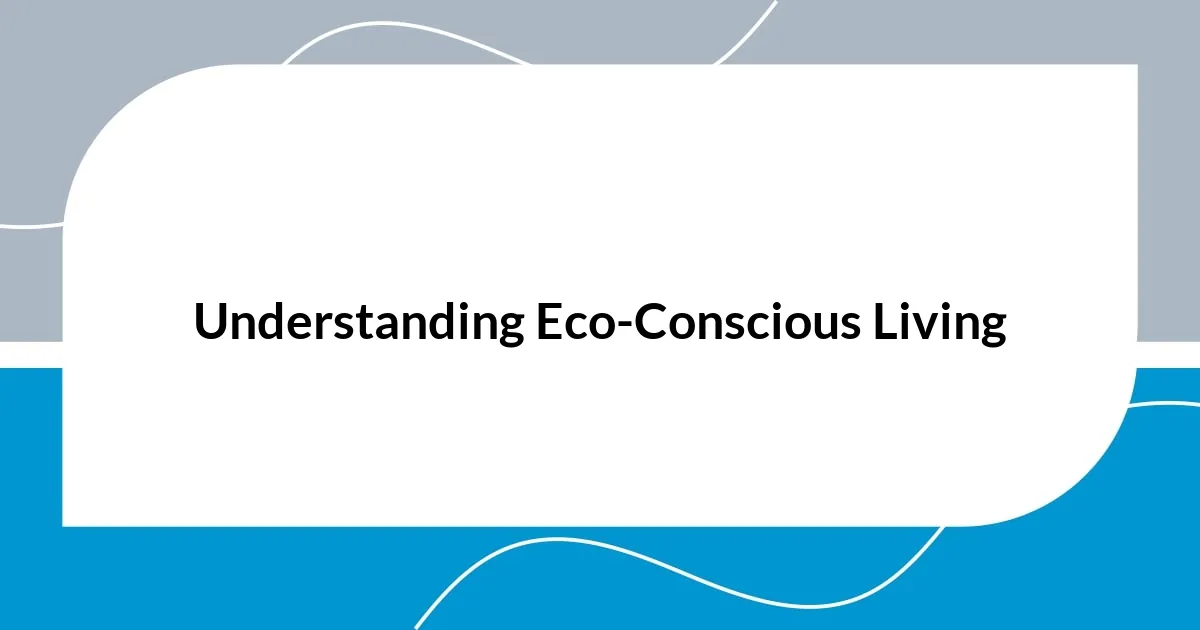
Understanding Eco-Conscious Living
Eco-conscious living goes beyond just recycling or using reusable bags; it’s a mindset shift that encompasses how we interact with the world around us. I still remember the first time I consciously chose to walk instead of drive, realizing that every small action can positively impact the environment. It was liberating, and it opened my eyes to the beauty of my surroundings, something I had overlooked while in the rush of daily life.
As I delved deeper into eco-conscious practices, I found myself evaluating my consumption habits. Have you ever stopped to think about where your food comes from? I used to mindlessly buy groceries without considering their origins. Now, I find immense joy in sourcing local produce, supporting farmers, and reducing my carbon footprint. The connection I feel with my community has enriched my life in ways I never anticipated.
Understanding eco-conscious living requires reflection, empathy, and a willingness to change. I genuinely believe it’s a journey of learning; the more I know, the more connected I feel to the planet. Each step I take towards sustainability—whether it’s choosing a plant-based meal or participating in community clean-ups—fills me with a sense of purpose. Isn’t it fascinating how our choices intertwine with the health of the Earth?
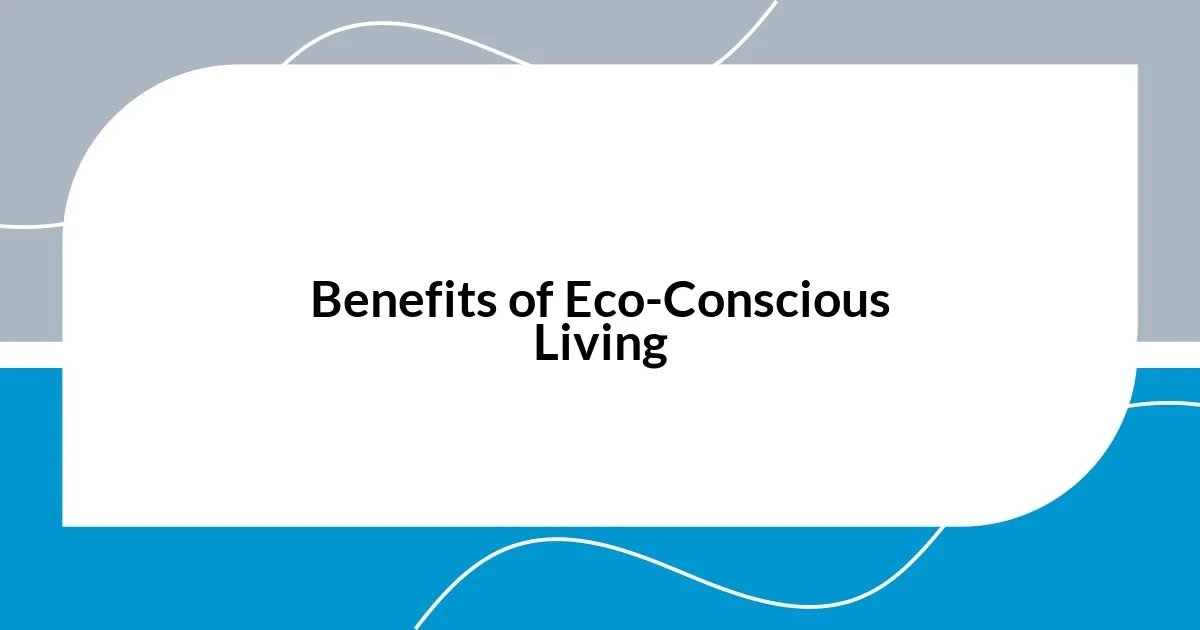
Benefits of Eco-Conscious Living
Living an eco-conscious lifestyle has transformed the way I view my daily choices. For instance, I once dreaded the thought of giving up my convenience-driven habits. However, when I started to embrace a more intentional way of consuming, like opting for second-hand shopping, I was genuinely surprised by how much I enjoyed the thrill of treasure hunting. It’s not just about saving money or reducing waste—it’s about creating stories with each unique find.
Additionally, I’ve noticed significant financial benefits from my eco-conscious decisions. When I began to reduce my reliance on single-use products, I started investing more in quality items that last. This shift not only lessened my waste footprint but also saved me money in the long run! Every reusable item I purchase feels like a small victory, a win for both my wallet and the environment.
I can’t ignore the emotional uplift that comes with eco-conscious living. There’s a deep sense of fulfillment in aligning my actions with my values. Volunteering for local environmental initiatives has not only connected me with like-minded individuals but has also instilled a greater appreciation for nature’s beauty. It’s powerful to witness the collective impact we can have when we all contribute a little—something as simple as participating in a community garden can significantly enhance one’s well-being.
| Benefits | Description |
|---|---|
| Financial Savings | Reduced reliance on single-use products helps save money through intentional purchasing. |
| Emotional Fulfillment | A deeper connection with environmental values enhances personal well-being. |
| Community Connection | Engagement in local eco-initiatives fosters relationships and a sense of belonging. |
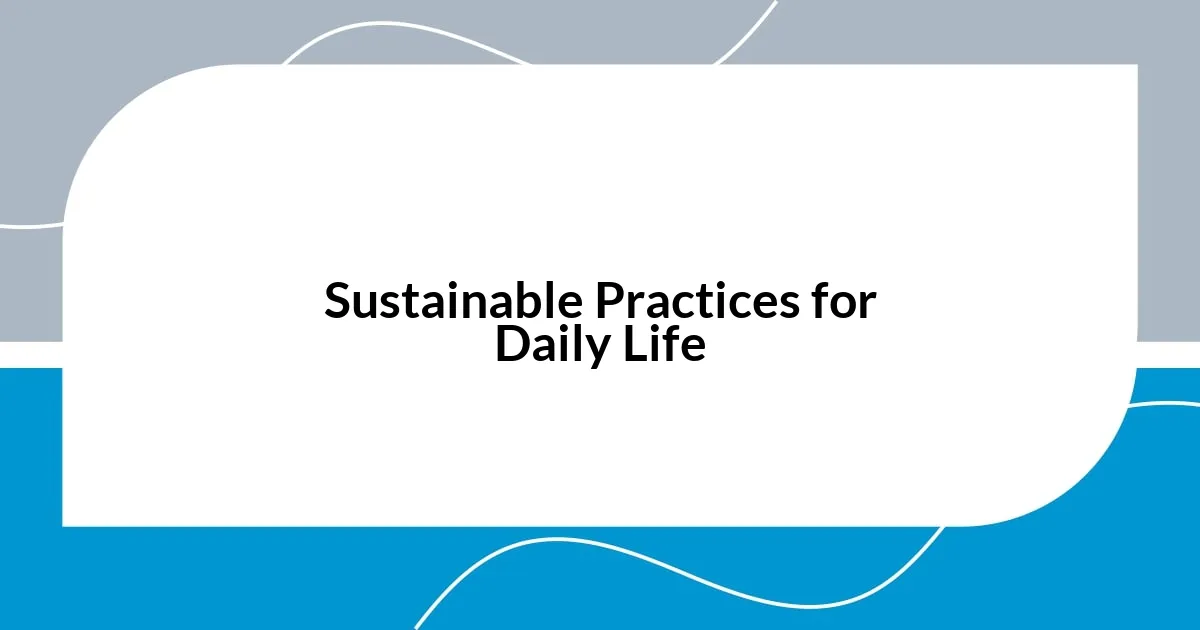
Sustainable Practices for Daily Life
I’ve found that incorporating sustainable practices into my daily life is both simple and profoundly rewarding. It’s amazing how small changes can create a ripple effect in my routine. For example, switching to a bamboo toothbrush was an eye-opener for me. It felt like I was doing my part in cutting down plastic waste without sacrificing functionality.
Here are some sustainable practices I’ve integrated into my life:
- Meal Planning: By planning my meals weekly, I minimize food waste and save money. Plus, it encourages me to try new recipes with seasonal ingredients.
- Composting: Starting a compost bin not only reduces landfill waste but also enriches my garden soil. There’s something gratifying about turning scraps into nourishment for my plants.
- Mindful Transportation: I embrace cycling for short trips, which adds exercise to my day while reducing my carbon footprint. It’s a simple way to connect with my neighborhood that I hadn’t appreciated before.
- Water Conservation: I’ve implemented simple habits like keeping a jar by the sink to collect water while waiting for it to warm up. This water is perfect for my plants!
- Opting for Bulk: Shopping in bulk has radically changed my grocery experience. I love feeling empowered to choose how much I buy and avoiding excess packaging.
Over time, these practices have woven themselves into the fabric of my lifestyle, enriching my days with a sense of purpose and connection to the planet. I can’t emphasize enough how often I feel inspired to share these practices with friends and family—nothing beats the feeling of innovation when we explore eco-friendly alternatives together!
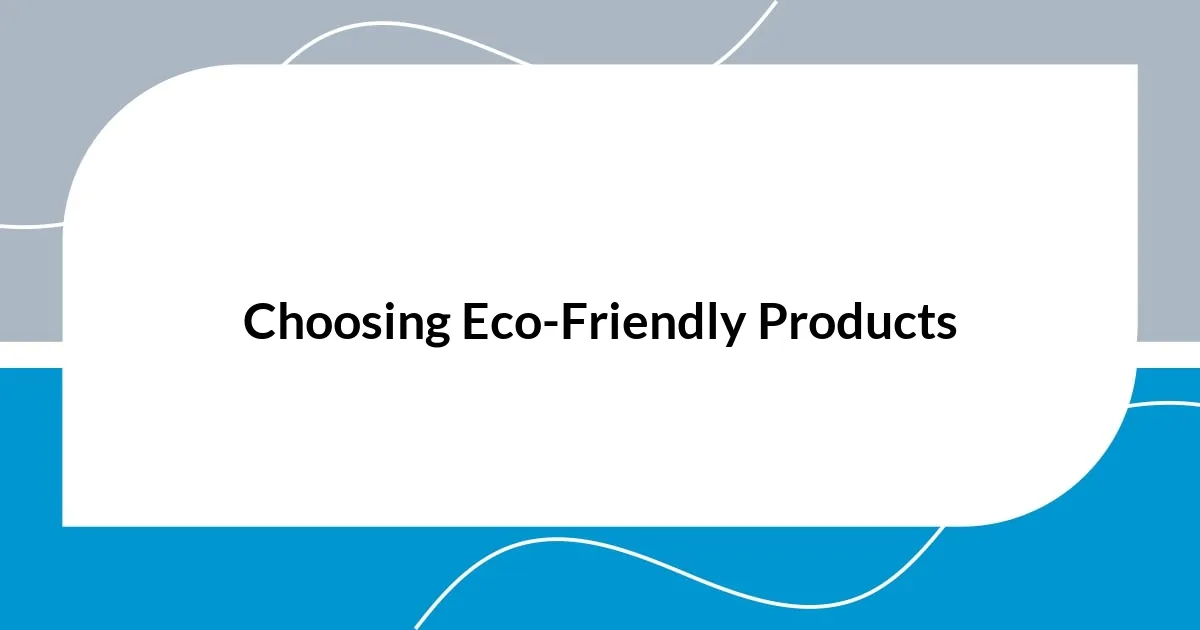
Choosing Eco-Friendly Products
Choosing eco-friendly products has been a journey that reshaped my perspective on consumption. I vividly recall when I first walked into a local store that specialized in sustainable goods. The vibrant colors of natural cleaning products and the enticing scents of organic skincare immediately drew me in. It felt refreshing to choose items that were not just gentle on the planet but also on my skin. Can choosing products with fewer chemicals really impact my health? I’ve found that yes, it truly can—my skin began to feel more balanced, and I noticed fewer irritations.
I also remember my initial hesitations while switching to eco-friendly brands. I thought the cost would be prohibitive, but to my surprise, many options were quite affordable! For instance, when I switched to a zero-waste shampoo bar, not only did it last longer than traditional shampoo, but it left my hair feeling fabulous too! This experience taught me that making eco-conscious choices doesn’t always mean breaking the bank. Rather, it’s about changing my mindset and being open to exploring new, sustainable alternatives.
As I continued this path, I realized the emotional benefits of choosing eco-friendly products went beyond just sustainability. There’s something profoundly rewarding about knowing that the items I bring into my home are made with love for the Earth. I recall the purchase of a handmade ceramic mug from a local artist; it wasn’t just a cup, but a connection to the community and a reminder of the stories behind every handcrafted piece. Each time I sip my morning coffee, I’m reminded of the importance of supporting small businesses and sustainable practices. Isn’t it amazing how these choices intertwine with our values? They not only reflect our commitment to a healthier planet but also enrich our lives on a deeper level.
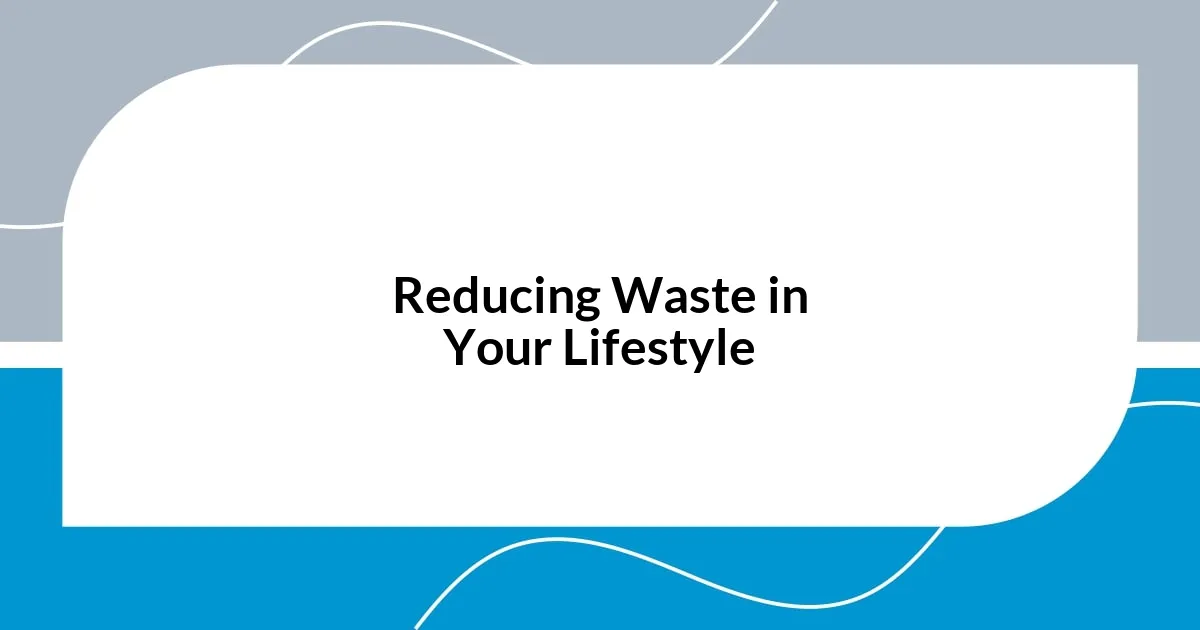
Reducing Waste in Your Lifestyle
Reducing waste in my lifestyle has been a gradual journey, and one of the most impactful changes I made was investing in reusable bags. I remember the first time I walked out of a grocery store with a collection of vibrant, cloth bags. It felt liberating—not only was I reducing plastic usage, but I also felt a sense of pride, knowing I was contributing to a cleaner planet. Isn’t it funny how something so simple can bring about such powerful feelings?
I’ve also discovered the joy of upcycling—taking items I once considered trash and transforming them into something useful. For example, I took an old glass jar and turned it into a stylish storage container for my kitchen utensils. It was a fun DIY project that not only decluttered my space but also sparked creativity in ways I hadn’t anticipated. Have you ever tried upcycling? The process is not just practical; it’s incredibly rewarding to see a wasted item gain new life.
One of the most enlightening experiences of reducing waste has been learning about minimalism. As I decluttered my home, I found that letting go of excess possessions created a sense of freedom in my life. I recall the moment I sold a box of unused items at a local flea market. Seeing those things go to new homes brought me joy, and it was a beautiful reminder of how our belongings can serve a purpose beyond our own use. Reducing waste goes beyond just physical items; it’s also about letting go of what no longer serves us, both materially and emotionally.
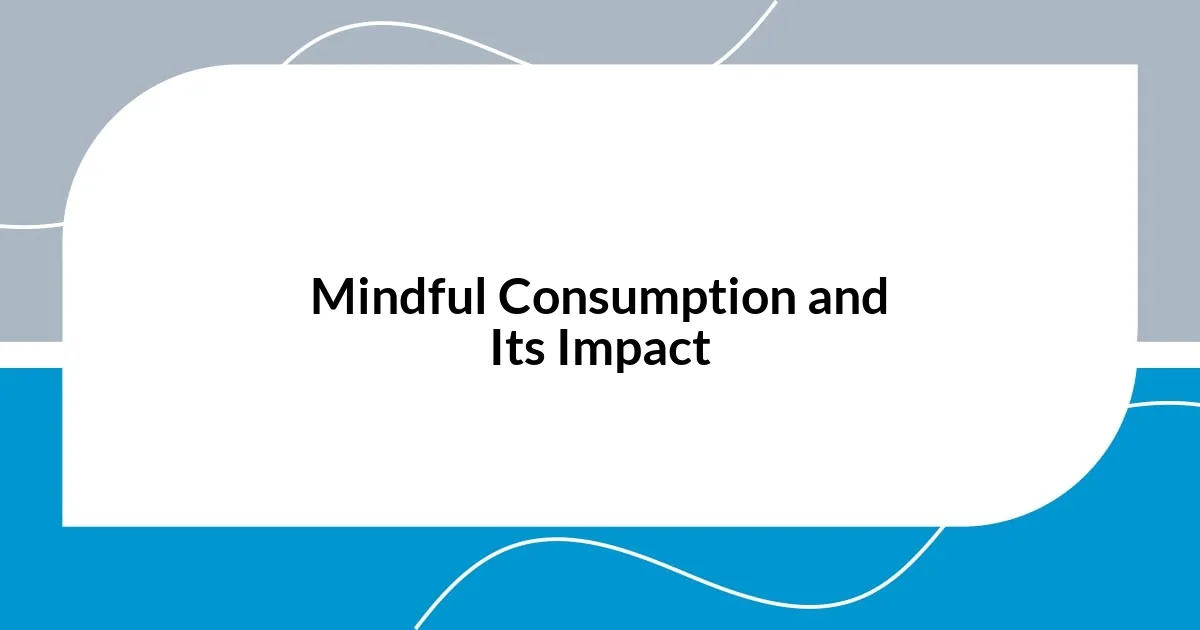
Mindful Consumption and Its Impact
Mindful consumption has changed how I approach everyday decisions. I still remember that moment in the grocery aisle when I was torn between a well-known brand and a lesser-known, sustainable option. Choosing the latter felt a bit like stepping outside my comfort zone, but as I began to incorporate more local and ethically produced goods into my diet, I found my appreciation for quality deepening. Have you ever felt that shift when making a conscious choice? It’s hard to describe, but I felt a renewed sense of connection to both my food and the local community.
As I explored more about mindful consumption, I became cognizant of the stories behind the products I buy. For instance, I once attended a farmer’s market and engaged with a vendor who passionately shared the challenges and joys of organic farming. Listening to her stories made the fruits I purchased so much more meaningful. It struck me that my choice was not merely about nourishment but about supporting a sustainable livelihood. Isn’t it remarkable how understanding the source of our food can transform our dining experience into something intentional and rich?
The emotional weight of mindful consumption goes beyond just buying with intention; it’s about the relationships we build with the earth and each other. The simple act of choosing a product can resonate deeper when I realize it’s fostering positive change. I often find myself reflecting on the impact of my choices—like the time I decided to purchase a handcrafted dining table from a local craftsman instead of a mass-produced option. Every meal shared around that table carries a story, a connection, and a commitment to sustainability. How powerful is that connection? It’s a reminder that our consumption patterns can indeed influence broader environmental and social narratives.
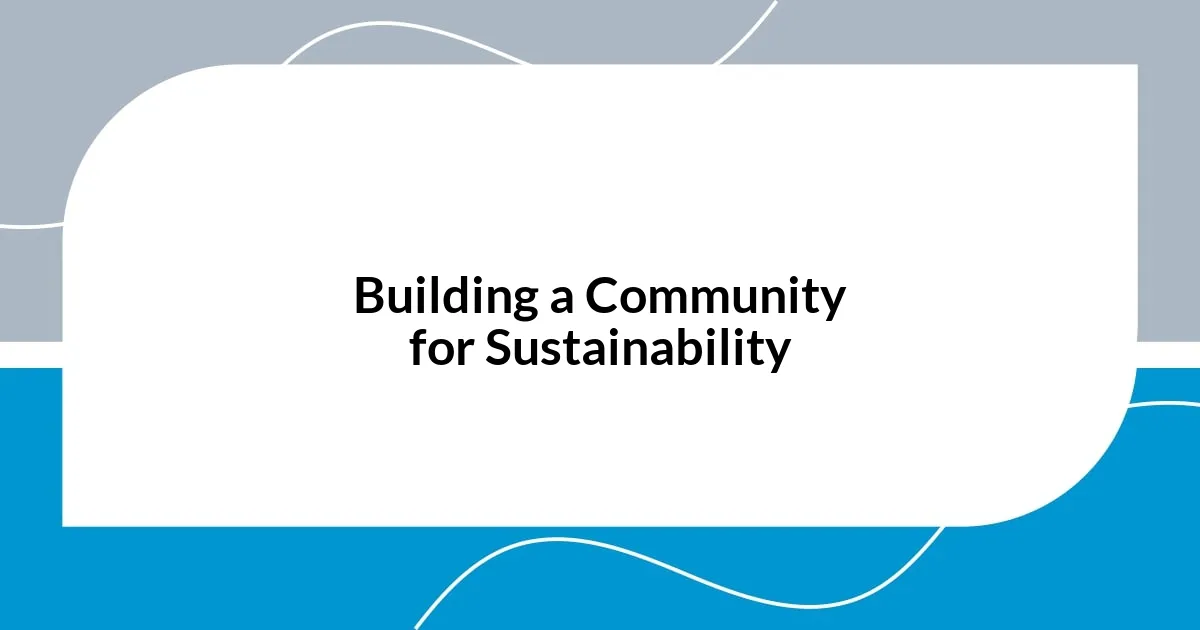
Building a Community for Sustainability
Building a community for sustainability has been one of the most enriching experiences in my eco-conscious journey. I vividly recall the first neighborhood meeting we organized to discuss local recycling initiatives. The energy in that room was infectious; people were eager to share ideas and take collective action. Isn’t it incredible how a shared goal can create a powerful bond among people?
I’ve also learned the value of connection through community gardens. I joined one in my area, and it transformed my understanding of food production. Planting seeds alongside neighbors not only nurtured my green thumb, but it also fostered friendships. We celebrated each harvest together, which made me realize the importance of community resilience. When we grow food together, we’re building something more than just gardens; we’re cultivating relationships and a shared commitment to sustainability.
One of the most impactful moments I’ve experienced was during a local clean-up event. As I picked up litter alongside others, I felt a deep sense of unity and purpose. Surrounded by like-minded individuals, it struck me that our small actions could ripple outwards, inspiring others to care for our shared environment. Have you ever felt that sense of community thrive when working towards a common cause? It’s a reminder that sustainability isn’t just an individual effort; it’s a collective journey, and together, we can amplify our impact.